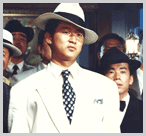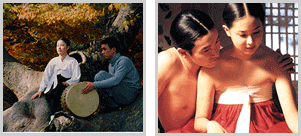





-
Section 3 highlights The General’s Son and Seopyeonje, the two films that bestowed the title of
national director on IM after decades of commitment and exploration. The model of Woomi Theater
in The General’s Son takes visitors back in time to the film set, while the pansori film brings to
their ears the voice of the director himself. Moreover, visitors can take a glimpse into the changes
in IM’s filming techniques through various film clips and collections.

-
Having established his signature style and worldview through many years of training and exploration, Im Kwon-taek imprinted his
name in the minds of Koreans by the 1990s. The General’s Son (1990) opened a new chapter in the history of Korean action films.
The pansori (Korean solo opera) film Seopyeonje (1993) dramatized the woes and affections of the Korean people. Both films broke
box-office records. Festival (1996) and Chunhyang (2000) were cinematic explorations of traditional Korean culture. Im was soon
dubbed a "national director."

- The Return to Action Films
-
The General’s Son (1990), based on a novel by Hong Seong-yu, is a triumphant manifestation of
Im Kwon-taek's skills as an action film master. His action films of the 1960s were influenced by
Hollywood, but The General’s Son is characteristically Korean, full of the sour odor of sweat.
Attracting more than 680,000 audience only at Danseong Theater in Seoul, it set an all-time high
box office record for a Korean film at the time. Two more sequels were produced as a result of the
popularity of The General’s Son.

- The Evolution of Pansori (Korean solo opera) Films
-
A local distributor took Im to a gisaeng (courtesan) house after his successful debut
with Farewell to the Duman River (1962). There, Im encountered pansori for the first time
and was thoroughly impressed. His resolution to make a film about pansori was realized 30
years later in Seopyeonje (1993). Seopyeonje is a faithful cinematic representation of the
beauty of pansori, while Chunhyang (2000) is the result of Im’s attempt to translate the conventions
of performing arts in pansori into the conventions of cinema.























